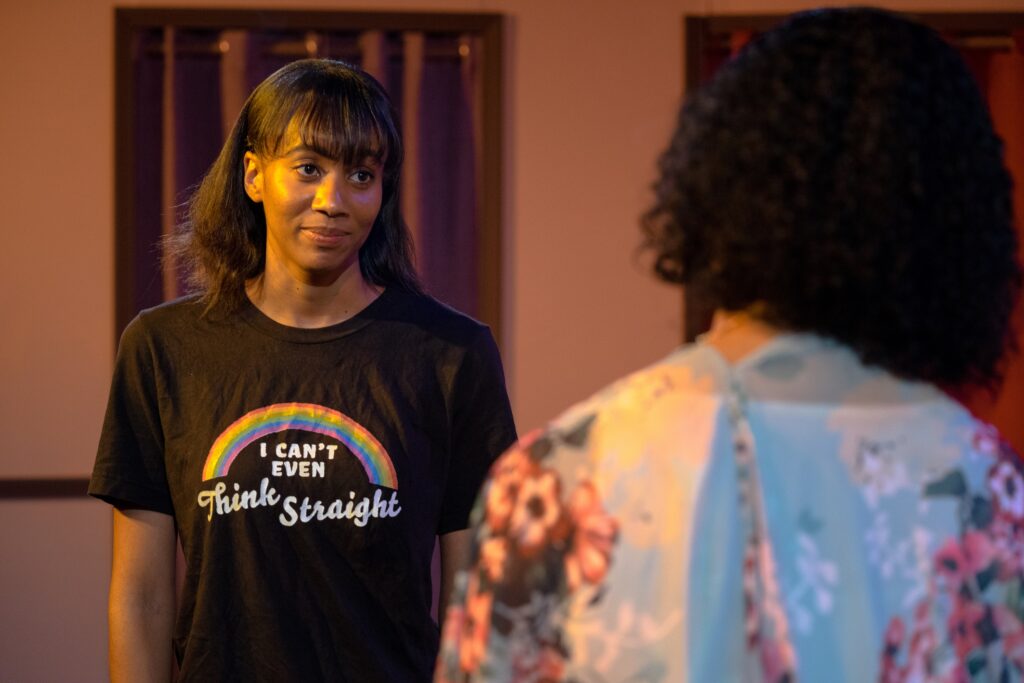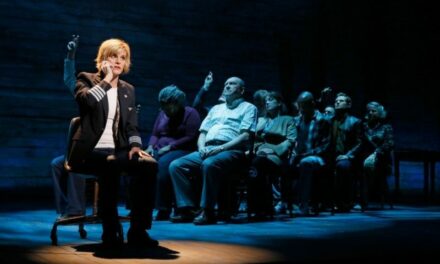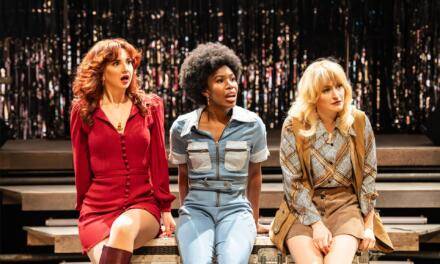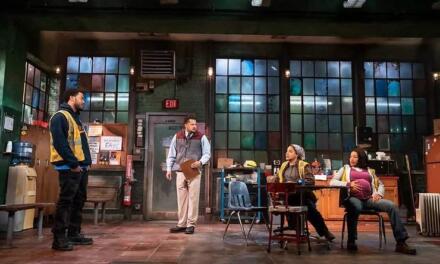The world premiere of a new play in North Hollywood opens old wounds for one man on his 50th birthday, and for an entire generation of men who watched their loved ones die in Nancy F***ing Reagan by Daniel Hurewitz. Larry Margo directs a cast of seven men and women who attempt to walk the fine line between comedy and drama in the shadow of the Reagans and the legacy they left behind when they opted to ignore the AIDS crisis in America during their administration.
Dean of Students at Cardiff College, Maggie (Debi Tinsley) and her recently retired, screenwriter-in-the-making husband Richard (Mark Sande) are hosting Maggie’s best friend David (Kiff Scholl) for his 50th birthday at their home in Palm Springs. They have invited Jason (Greg Ivan Smith), another old friend of David’s with a contentious history between them, and Jason’s younger boyfriend Kenny (Colbert Alembert) to join them but even David’s desire to pick a fight with Jason about his predilection for younger men in short term relationships and his own angst about turning the big 5-0 is overshadowed by a funeral procession for Nancy in Palm Springs and a public viewing that sets David off on several rants about the woman.

L to R: Colbert Alembert, Debi Tinsley, Mark Sande, Kiff Scholl, and Greg Ivan Smith in Nancy F***ing Reagan. Photo by Moses.
If things weren’t already emotionally charged with David taking Kenny to task for not knowing the history of what he refers to as his ‘tribe’, one of Maggie’s students Allison (Safiya Quinley) shows up at the house wanting to discuss her latest interaction with a racist teacher, threatening to go to the Press if she is denied. Maggie has her own issues with the racist and sexist President of the College but her attempts to delay or smooth things over with Allison only pushes the student to express her views more vehemently and soon David becomes determined to make some kind of statement over Nancy Reagan’s coffin. He wants to pour blood over it to signify the blood she has on her hands and after doing some research and reading And The Band Played On, Kenny is more than a game to help him.
The gesture of activism doesn’t quite go as planned (the bag of blood Kenny mixed from grocery store ingredients leaks when David tries to sneak it into the viewing area and stains his shorts just where you imagine it would), but David is determined to do something so he shouts “Nancy Reagan has the blood of 1000s of People With AIDS on her hands!”. Kenny joins him and the two continue shouting until David gets carried away and kisses Kenny – who pauses but then returns the kiss that is broadcast on television for Jason, Maggie, Allison, and Richard to see back at home. David lost the love of his life to AIDS. His name was Alex Cantu, and Jason had a fling with him during one of what we understand to be the many instances when Alex and David broke up before getting back together. Jason is HIV positive but Kenny knows that and doesn’t mind.

L to R: Safiya Quinley and Debi Tinsley in Nancy F***ing Reagan. Photo by Moses.
One might argue that David’s televised kiss makes him and Jason even, but the latter doesn’t see it that way. Instead, he’s packed and ready to go the moment Kenny and David are released by the Secret Service (there is no law to detain them). Though Allison came into Maggie’s life dead set on creating a manifesto to alter everything about Cardiff that she finds offensive, she leaves with an understanding that she needs to know how to compromise in the name of progress. Kenny tells David that he hasn’t felt so alive in a long time and leaves with Jason. Richard retires early leaving Maggie and David to enjoy his birthday cake offstage.
It’s true, the Reagans have a lot to answer for. It’s true, people died tragically while they pretended there was nothing to see here. The play does grant us a cathartic dream-like moment where perhaps we can all enjoy hearing someone tell Nancy exactly what she can do with her policies that were driven by her blank smile that seemed aimed at burying everything she felt wasn’t proper or nice. The script gets credit for all of this, however, it is a repetitive piece of writing that plays the same beats over and over, taking the air out of David’s building outrage by keeping us in that living room, circling the same topic of conversation. It could be condensed to half the length and not lose a thing – in fact, it would gain dramatic tension that it currently lacks. Kiff Scholl and Colbert Alembert’s moment of protest over the coffin (that was a cardboard refrigerator-type box with the ‘this way up’ text still visible on the side) is a thrilling thing to watch that is beautifully acted and will bring tears to your eyes if you have a heart, but moments like that are soon lost in meandering scenes of dialogue where Maggie seems to just be annoyed by everything, Richard has decided to detach in a playful way, and Allison is inexplicably very relaxed in this home full of strangers.
The set design by Chris Winfield evokes Palm Springs quite well, with a space carved out for a balcony or deck in one corner of the stage, but the direction makes no sense of the space at all, especially when a TV reporter named Erica (Amy Kersten) enters from areas that have been more or less defined as the front door, kitchen or bedrooms to give a news update that frankly doesn’t seem necessary. It would have been just as effective to give her lines of exposition to one of the other characters in the house rather than break up the spatial logic of the world like that. It might have been opening night tech jitters or confusion on the part of the operator but the lighting design by Douglas Gabrielle didn’t always make sense, with the stage getting darker when it seemed it was supposed to be lighter and with lights so brightly focused on the couch, no matter where the actors were at any given moment. The sound design by Steve Shaw seemed minimal to the point of hardly playing a role and though the costumes and props designed by Cheryl Crosland fit the time and space, drinks from night one of the play are left on the table throughout and neither the costumes nor the props necessarily tell us much about the characters or the world.
It could be said it would be worth a viewing just to see that moment from Kiff Scholl and Colbert Alembert but it might be better to keep an eye on those two actors and seek them out in another production. The subject of the play is something we need to witness, understand and discuss. The execution of it lacks the clarity that ultimately diffuses any power it might have.
Presented by Judith Taranto. Production Managed by Judith E. Courtney Rhodes is the Stage Manager/Light Operator.
This post was written by the author in their personal capacity.The opinions expressed in this article are the author’s own and do not reflect the view of The Theatre Times, their staff or collaborators.
This post was written by Christine Deitner.
The views expressed here belong to the author and do not necessarily reflect our views and opinions.


















